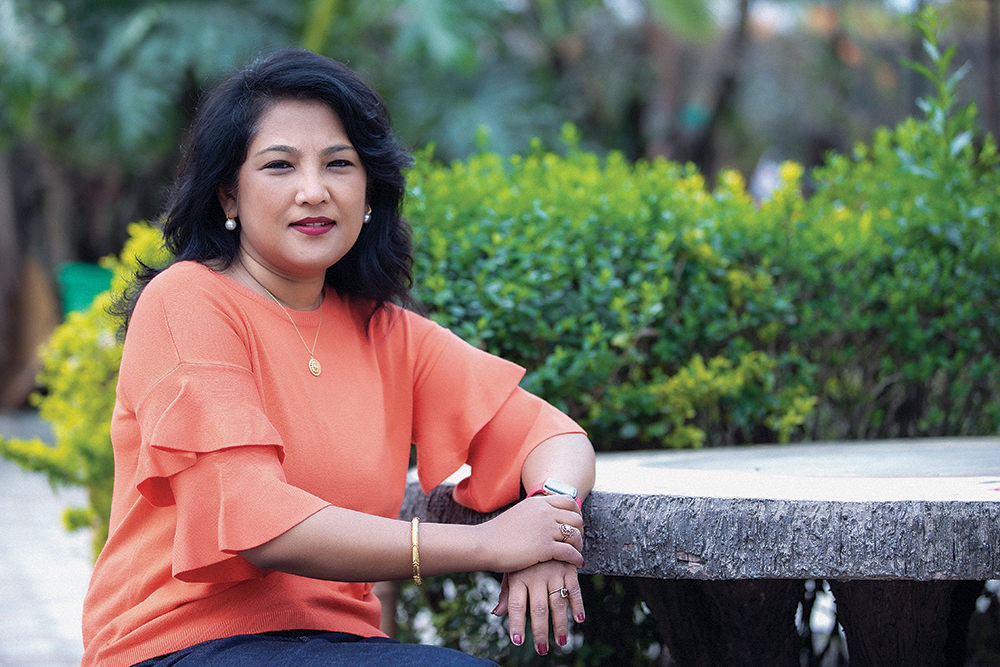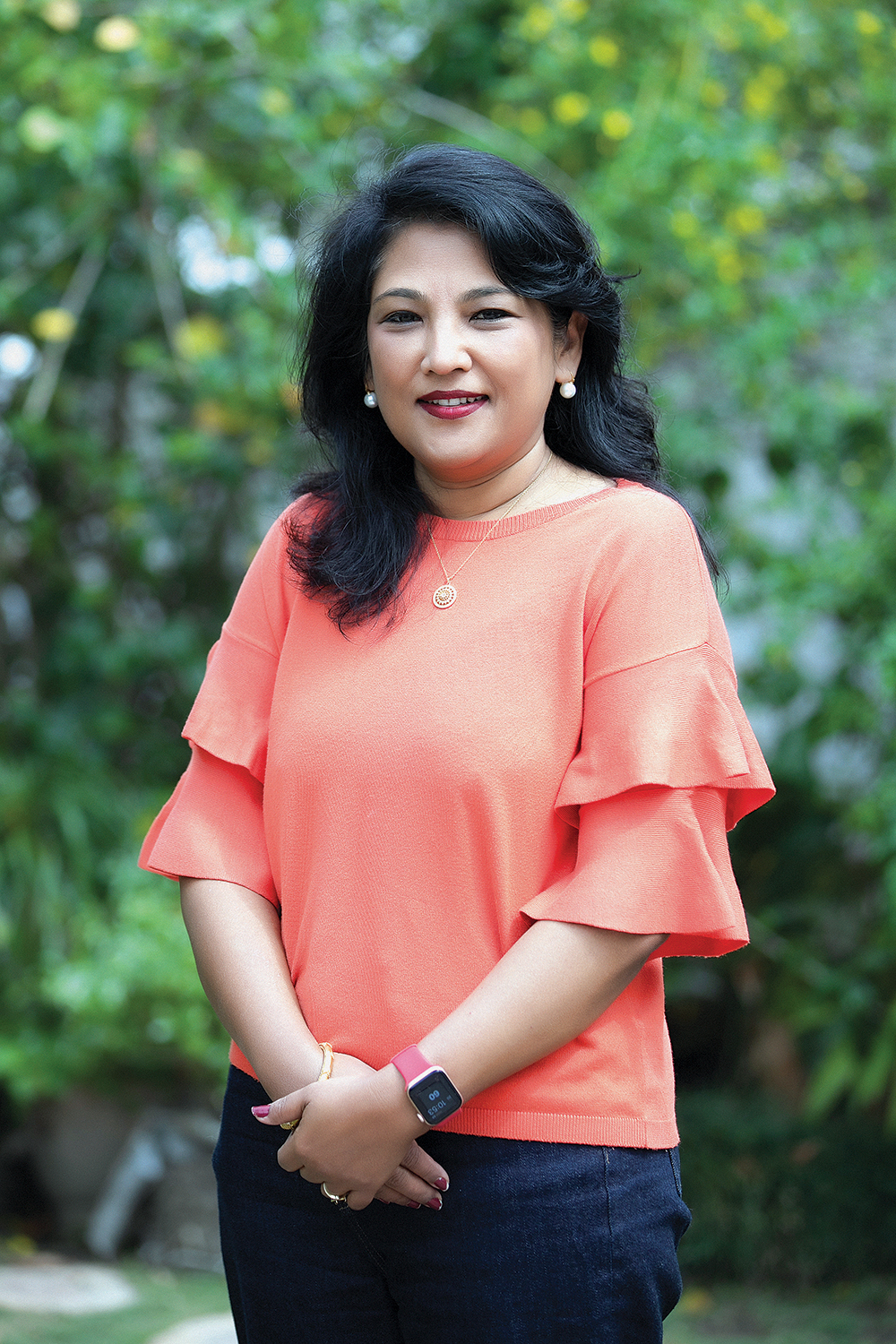
Dr Mona Shrestha Adhikari
Chief Executive Officer, EMERGE
“In Nepal, the overarching problem is the patriarchal mindset and structures that hold women back from taking leadership roles. Being provided with opportunities, mentorship and confidence building measures can contribute to changing the status quo,” says Dr Mona Shrestha Adhikari, Chief Executive Officer of Enterprise for Management, Economic Reform and Gender Equality (EMERGE). Dr Shrestha is an international expert on Gender Equality and Social Inclusion. She has more than three decades of experience working in the private sector, and national and international non-governmental organisations in various countries. Her experience ranges from working with organisations like the World Trade Organisation (WTO) and International Trade Centre (ITC) in Geneva, and Economic Policy Incubator project of Department for International Development (DFID)/Palladium Group in Nepal which required working in close coordination with the Ministry of Women, Children and Social Development and Ministry of Finance of the Government of Nepal. Over the years she has conducted extensive studies and published on the topics of judicial gender equality, gender and trade and various contemporary socio-economic issues and presented papers at a number of international conferences. One of her works ‘Nepalese new women workers in the hotel industry: Exploring women’s work and respectability’, has been published in a book titled ‘Rethinking New Womanhood: Practices of Gender, Class, Culture and Religion in South Asia’ in 2018 by Palgrave Macmillan, United Kingdom. Dr Shrestha holds a PhD in Women and Gender Studies from the University of Warwick (UK), Master of Arts (MA) in Development Studies specialising in women, gender and development from the Institute of Social Studies (the Netherlands) and Master of Business Administration (MBA) from University of Pune (India). Excerpts of a conversation with Dr Shrestha:We talk about inclusion of all genders, not just women, in the professional sphere and in personal life, but the fact is that we still have to celebrate Women’s Day to fight for equal space and opportunity. How do you view this?
We should continue to celebrate Women’s Day because it is important to celebrate women’s achievements thus far as well as remind everyone of the gender gap that exists. It is also pertinent for us to map the existing forms of discrimination against women and strive towards eliminating them. We ‘speak’ about inclusion both in our professional and personal lives but there are a few of us who have reached the ‘implementation’ stage. The path from speaking to implementation takes intent, time and courage. When we are addressing gender issues, we need to understand that gender refers to the socially constructed roles, behaviours, identities and expressions of people. One should not be excluded and/or discriminated against because of their gender. Often the words gender and women are used/understood interchangeably, which is incorrect. The theme for this year was DigitALL, with a focus on making information technology more accessible to women. How can we encourage more women to participate in the digital space? The digital skills that were once considered as ‘good-to-have’ skills have now been mainstreamed as one of the ‘must-have’ skills to possess in all facets of life. I believe there are 4A’s determining the level of engagement in the digital economy: Accessibility, Affordability, Applicability and Adaptability. Accessibility is about being able to have the access to technology, internet with good bandwidth, electronic gadgets, and the availability of good source/quality of energy. Being able to afford high bandwidth internet makes a difference in what information and resources can be accessed digitally and effectively utilised. To stay actively engaged in the digital space requires upskilling one’s knowledge and expertise, applying them into one’s life. One needs to constantly adapt to the culture and practice of going digital. For example, women must be supported in adapting to new digital skills such as social media engagement, new payment systems including e-payments to keep abreast and actively participate in the digital space. Clearly due to several social, economic and political factors women at large need support in all these areas so that they are not discriminated against and not left behind. If we can address the 4A’s focusing on women, it will definitely enable more women to participate as well as benefit from the growing digital economy.
What are the major roadblocks to women being empowered?
This is a very broad question. It depends on which sector and which women we are talking about, because the answer may vary contextually. Also, what empowerment means for one woman may not be the same for another and the meaning of empowerment for a person can change over time. Empowerment is also a process of change and not necessarily an end in itself. That said, if we consider empowerment as one’s ability to make strategic life choices; choices that one has been denied of, women in Nepal are deeply constrained by the patriarchal mindset and structures existing at home and market and/or created/reinforced by the state to make such strategic choices. For example, women have limited access to and control over resources leading to limited access to finance. On a regular basis, we come across the use of biases in language and gender stereotypes that are rampant in social media which reinforce the patriarchal mindset and structures. The predefined notions of masculinity and femininity also influence the choices women make in terms of education, employment, and business. These notions also affect the way markets operate and the policies and programmes that any institution including the state develops and implements.How would you describe the current status of Nepali women?
Well, clubbing all women into one would not be fair as it depends on which women we are referring to. Again, a very broad and difficult question to respond to. However, in general, on the one hand, if we look at urban women, they have better access to resources (financial, employment, education, etc) and have more choices compared to those in rural settings due to the state of infrastructure and the limited options. On the other hand, urban women are also struggling to be powerful strong women who are competitive in the male-dominated world but find themselves often overburdened in different ways than rural women. There are other identities of women based on one’s class, caste, religion, etc making it difficult to respond in a few lines.As per FWEAN, prior to the pandemic women were running around 5,000 businesses and almost 500,000 were self-employed. Yet the road to women being financially independent is a long one. How can this be ensured?
Addressing the patriarchal mindset and structures that obstruct women from making strategic choices also has implications on women’s financial status as they are constrained in accessing resources including information. This situation is common in many regions such as in South Asia, East Africa and Latin America, where I conducted a survey for the World Trade Organisation in 2019-2020. The survey shows that women businesses in all regions faced access to finance as one of the major obstacles in doing business, followed by the economic and political environment in the country. The lack of information and adequate knowledge on business, trade and market was another prominent challenge they all encountered that hindered their growth to expand globally. It is necessary to pool in efforts in addressing these challenges for women entrepreneurs so they can grow and upscale their business leading to financial gain. Therefore, for women to be financially independent, education and skills are important and equally important are the policies of the government and the various financial and non-financial institutions. These policies play an important role in encouraging and supporting women to be financially independent. If these factors are addressed when formulating and implementing policies and programmes keeping in mind the challenges women face when doing business, it will help enrich the lives of women in general making them financially independent. Equally important is the change in social norms and behaviour in who controls financial resources at the household level.As the CEO of EMERGE which focuses on capacity building of the business ecosystem, entrepreneurship development and gender equality, what are the major challenges you face while working at the grassroots level?
Actually, working with women and other actors on the ground is interesting, and I learn a lot from them. One major challenge I find is that programmes and projects often do not conduct baseline surveys and take stock of them while implementing them. Equally important is to include the voices of the actual beneficiaries and securing their ownership. If that is not done, challenges occur while trying to convince and coordinate with those on the ground why their participation or engagement in certain programmes and projects is beneficial for them. Basically, I still find the top-down approach applied in several development projects. In situations where the bottom-up approach has been well integrated into programmes and projects, there are fewer challenges, higher community ownership and better results. In our previous work with women businesses, one of the challenges we faced on the ground besides coordination is the tendency to start a business in a sector where there are already many women engaged. For example, in strawberry production, we would find the majority of women involved in it resulting in increased supply and consequently lower prices for strawberries. This also leads one to question why women tend to fall under peer influence, taking up businesses in sectors that are so-called feminine. Adequate market research and business training skills are areas that development partners including the state can focus to encourage and promote business in sectors that Nepal has comparative advantage. We continue to face the challenge in trying to address the different and diverse needs of women entrepreneurs to thrive in the business ecosystem. This demands long-term interventions and is resource demanding, which is why we believe in a partnership modality of working so that more actors can contribute to building a stronger local entrepreneurship and a resilient economy that is both inclusive and sustainable.
Published Date: April 30, 2023, 12:00 am
Post Comment
E-Magazine
RELATED Face 2 Face



.jpg)
.jpg)
.jpg)